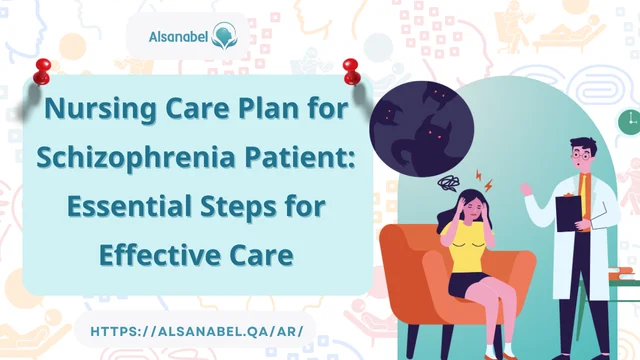
Schizophrenia is a complex mental health disorder that affects a person’s ability to think clearly, manage emotions, make decisions, and relate to others. For nurses, providing care to individuals with schizophrenia requires a comprehensive and individualized nursing care plan for schizophrenia patients. This plan includes medical, psychological, and social interventions designed to improve the patient’s quality of life and promote stability. Effective nursing care can significantly reduce the risk of relapse, improve daily functioning, and help patients manage their symptoms.
In this article, we will explore the key components of a nursing care plan for schizophrenia and the nursing interventions for schizophrenia that can help provide optimal care.
Understanding the Care Plan for Schizophrenia Patients
A care plan for schizophrenia patients focuses on several aspects of patient care, including managing psychotic symptoms, improving cognitive function, and enhancing social skills.

Schizophrenia presents with positive symptoms (such as hallucinations and delusions) and negative symptoms (such as apathy and social withdrawal), both of which require targeted interventions. The care plan should aim to address these symptoms while fostering the patient’s independence and social integration.
Essential Components of a Nursing Care Plan for Schizophrenia Patients
1. Assessment and Diagnosis
The first step in any nursing care plan for schizophrenia is a thorough assessment of the patient’s current condition. Nurses should evaluate both the mental and physical health of the patient, including an assessment of their cognitive abilities, mood, behavior, and any present delusions or hallucinations. Identifying the patient’s strengths and limitations will help tailor the care plan to their specific needs.
2. Medication Management
Medications, particularly antipsychotic drugs, play a central role in the nursing care plan for schizophrenia patients. These medications help manage psychotic symptoms like hallucinations and delusions. Nurses must ensure that the patient adheres to their prescribed medication regimen, monitor for side effects, and report any concerns to the healthcare team at Al Sanabel Specialized Psychiatric Center In Qatar. Teaching patients about their medications and the importance of adherence is a key intervention in preventing relapse.
3. Managing Hallucinations and Delusions
Hallucinations and delusions are among the most challenging symptoms to manage. Nursing interventions for schizophrenia patients experiencing these symptoms include calmly acknowledging the patient’s experience without reinforcing the delusions or hallucinations. The nurse should help the patient focus on reality-based tasks and conversations while encouraging them to express their feelings in a safe and supportive environment.
4. Promoting Social Interaction and Communication
Schizophrenia patients often experience social isolation and difficulty communicating with others. Nurses can assist by encouraging patient care for schizophrenia that includes social interaction. Group therapy sessions, social skills training, and community involvement can help patients develop relationships and improve their social functioning. It is also important for the nurse to provide support for family members and caregivers to ensure they understand the patient’s condition and how best to support them.
5. Enhancing Daily Living Skills
Many schizophrenia patients struggle with basic activities of daily living (ADLs), such as personal hygiene, meal preparation, and managing their home environment. The nursing care plan for schizophrenia patients should include training and assistance in these areas to improve independence. Occupational therapy and structured routines can help patients regain control over their daily lives and reduce the negative impact of schizophrenia on their functioning.
6. Monitoring for Suicide Risk and Self-Harm
Schizophrenia patients are at a higher risk for suicidal thoughts and self-harm. Nurses need to be vigilant in assessing the patient’s mental state and identifying any risk factors for suicide. Providing emotional support, ensuring a safe environment, and collaborating with mental health professionals like Dr. Sanabel Al Akras are essential for reducing the risk of self-harm in patients.
Recovery and Long-Term Care
Recovery from schizophrenia is an ongoing process that requires long-term care and support. Nursing interventions for schizophrenia should be regularly reviewed and adapted as the patient’s condition evolves. Long-term goals include maintaining symptom control, improving social and occupational functioning, and preventing relapse through ongoing monitoring and support. Collaboration with a multidisciplinary team—including psychiatrists, psychologists, social workers, and caregivers—is crucial for delivering comprehensive care.

Integrating PTSD Treatment in Schizophrenia Care
For some patients, schizophrenia can be complicated by co-occurring conditions such as post-traumatic stress disorder (PTSD). In Qatar, PTSD treatment in Qatar is available and can be integrated into the care plan for schizophrenia patients who are also dealing with trauma. Nurses should be aware of any underlying PTSD symptoms and ensure that both conditions are addressed in the patient’s treatment plan.
Nursing Care Plan for Schizophrenia Patients FAQs
1. What are the main goals in a nursing care plan for a schizophrenia patient?
The primary goals in a nursing care plan for schizophrenia patients are to reduce psychotic symptoms (such as hallucinations and delusions), improve daily functioning, enhance social and communication skills, and prevent relapse. Long-term goals focus on maintaining stability and improving quality of life.
2. How should a nurse handle a patient experiencing delusions?
When a patient is experiencing delusions, the nurse should calmly acknowledge their feelings without reinforcing the delusion. Nursing interventions for schizophrenia patients with delusions involve redirecting their focus to reality-based tasks and maintaining a supportive, nonjudgmental approach.
3. What is the role of medication in nursing care for schizophrenia patients?
Medication plays a central role in managing schizophrenia symptoms, particularly through antipsychotic drugs. Nurses are responsible for ensuring that patients adhere to their medication regimen, monitoring for side effects, and educating the patient about the importance of staying on their prescribed treatment.
4. How can a nurse assist in improving the daily living skills of schizophrenia patients?
Nurses can help patients improve their daily living skills by providing structured routines, encouraging independence in personal care, and offering occupational therapy to support skills such as cooking, cleaning, and managing their environment. These interventions promote autonomy and confidence in managing everyday tasks.
5. What interventions are important in managing hallucinations in schizophrenia patients?
To manage hallucinations, nurses should create a calm and safe environment, helping the patient stay grounded in reality. Encouraging reality-based conversations and tasks, providing reassurance, and teaching coping strategies are important nursing interventions for schizophrenia patients who experience hallucinations.
Caring for a patient with schizophrenia requires a well-structured nursing care plan for schizophrenia that addresses both the mental and physical health needs of the individual. With effective nursing interventions for schizophrenia, patients can manage their symptoms, regain independence, and improve their quality of life. Collaboration with the healthcare team, patient education, and long-term support are essential components of successful patient care in this challenging condition.
